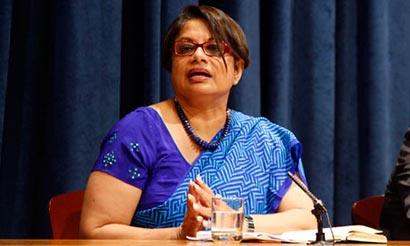Sri Lanka removed from UN ‘list of shame’

Sri Lanka has been removed from the ‘list of shame’ in UN Secretary-General Ban Ki-moon’s annual report on children and armed conflict during 2011.
U.N. special representative for children and armed conflict, Radhika Coomaraswamy speaking on the omission stated that the removal came after Sri Lanka’s successful completion of Security Council-mandated action plans to end the recruitment and use of children.
During the war both the LTTE and the TMVP were in the UN ‘list of shame’. However with the end of the war and the military defeat of the LTTE as well as the TMVP working with UNICEF to release all child recruits, both the LTTE and TMVP were no more on the list.
Full release;
The Secretary-General issued his annual report on children and armed conflict to the Security Council which gives an overview of the situation of girls and boys in conflict zones and measures taken for their protection. The report includes a list of parties who recruit and use children, kill and maim, commit sexual violence or attack schools and hospitals; the so-called “list of shame.”
“2011 shows a mixed picture. While new crises erupted with a heavy toll on children such as in Syria, and also in Libya, violations against girls and boys have come to an end in other parts of the world,” the Special Representative of the Secretary-General for Children and Armed Conflict Radhika Coomaraswamy said.
De-listings, new action plans, releases of children
Encouraging is the delisting of parties to conflict in Nepal and Sri Lanka after their successful completion of Security Council-mandated action plans to end the recruitment and use of children. In 2011, five more parties in Afghanistan, the Central African Republic, Chad and South Sudan entered into similar agreements with the United Nations.
In 2011, releases of children associated with armed forces and armed groups have taken place in Central African Republic, Chad, Colombia, DRC, Myanmar, South Sudan and Sudan.
“The progress is continuous but the list of parties to conflict who harm girls and boys will always be too long,” SRSG Coomaraswamy said. 52 parties including four new parties in Sudan, Yemen and Syria were listed.
First listing of parties to conflict responsible for attacks on schools and hospitals
For the first time ever, the Secretary-General listed parties responsible for attacks on schools and hospitals in addition to those who recruit, kill and maim, or commit sexual violence. The listing is the result of Security Council resolution 1998 adopted last year.
On the list are armed groups in Afghanistan, the Democratic Republic of the Congo, and Iraq as well as the Syrian Government forces who regularly shell, burn, loot and raid schools, as well as assault or threat teachers, students, and medical personnel.
“In conflict, schools and hospitals must be zones of peace respected by all parties,” SRSG Coomaraswamy emphasized.
Persistent perpetrators
Of serious concern is also the growing list of persistent perpetrators of grave violations against children which has doubled since last year. 32 parties to conflict have been listed by the Secretary-General for at least five years and are therefore considered persistent perpetrators.
“We must put more pressure on these parties through sanctions, other Security Council action, and closer collaboration with national and international courts,” SRSG Coomaraswamy said.
Action plans are another means to engage persistent perpetrators to end grave violations against children. Yet the dialogue with armed groups is often challenged by security constraints which hampers the United Nation’s independent access to these armed groups for dialogue.
Emerging situations
New crises have caused enormous suffering for children and continue in 2012. In Syria, children were victims of killing and maiming, arbitrary arrest, detention, torture and ill-treatment, including sexual violence, by the Syrian Armed Forces, the intelligence forces, and the Shabbiha militia.
Children between 8 and 13 were forcibly taken from their homes and used by soldiers as human shields, placing them in front of the windows of buses carrying military personnel into the raid on villages. Schools have been regularly raided, used as military bases and detention centres. In detention, girls and boys were beaten, blindfolded, subjected to stress positions and to electrical shocks, as well as whipped with heavy electrical cables.
“The world is keeping a detailed account of the violence committed against civilians in Syria and I am confident that these crimes will not go unpunished,” SRSG Coomaraswamy said.
Child suicide bombers
Another worrisome trend is the increasing use of girls and boys as suicide bombers and “victim” bombers. “Victim” bombers are those who do not know that they are carrying explosives and are detonated from distance. In 2011 alone, at least 11 children in Afghanistan and another 11 girls and boys in Pakistan were killed while conducting suicide attacks, some as young as eight years.
“The world should unite against this inhuman and perverse practice of child suicide bombers,” the Special Representative said.
Courtesy: Ada Derana

Latest Headlines in Sri Lanka
- Court of Appeal to rule on IGP Tennakoon’s arrest warrant on March 17, 2025 March 12, 2025
- Military deserter arrested for sexually assaulting doctor at Anuradhapura Hospital March 12, 2025
- Tuition teacher under investigation for student assault ignores NCPA summons March 12, 2025
- Sri Lanka maintains stance on Adani, open to investment March 12, 2025
- Doctors strike over delay in arrest of sexual assault suspect March 12, 2025



I suggest we enter the names of l Ban Ki-moon and Navi Pillai on the place vacated by Sri Lanka in order to reflect the under-hand conpirational way they both behave when dealing with the issue of Sri Lanka.